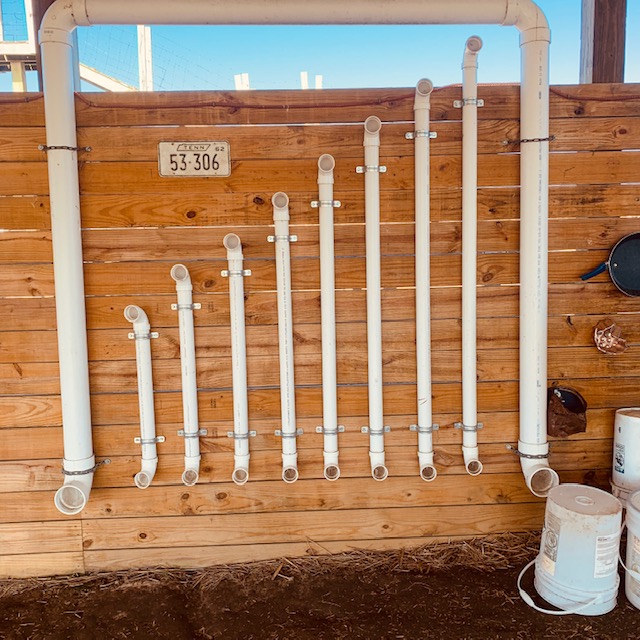
Features
Business
Marketing Matters
Marketing Matters: Nitty gritty Tennessee market music
Three different farm businesses pinpoint their niche.
February 5, 2020 By Cathy Bartolic
 Different lengths of plastic plumbing pipes at Autumn Acres, ready to make music with the help of a precocious percussionist. Photo courtesy of Cathy Bartolic.
Different lengths of plastic plumbing pipes at Autumn Acres, ready to make music with the help of a precocious percussionist. Photo courtesy of Cathy Bartolic. When you visit agritourism operations in a concentrated manner, the strengths of each one shine through. This was especially true during Ontario Farm Fresh Marketing Association’s (OFFMA) latest study tour to Tennessee last November.
Lucky Ladd Farms
The first stop was Lucky Ladd Farms, a huge fun park that has everything from pumpkins to play areas to a petting zoo.. Amy and Jason Ladd are fairly new to this industry. They started their farm in 2009, and have developed a well laid out operation focusing on animals and educational activities targeted at four to eight-year olds.
Efficiency is one of their key challenges. The Ladds review labour costs on a regular basis and adjust as needed. Their food concessions are all set up to have customers place their orders at one window and pick up at another window. The largest food prep area is set up in a ‘U’ shape so it can easily be staffed with three people. This attention to efficiency became evident during our behind-the-scenes tour, and we could see why it has helped their bottom line.
Autumn Acres
Autumn Acres is located halfway between Nashville and Knoxville, and are only open in the fall. The owners’ primary business is construction, but Stephanie Woods wanted to have a farm to share with the public, and set up Autumn Acres as a perfect way to make use of her agriculture and education degrees. The biggest challenge for any seasonal business is to find good staff for only a few months of the year. In this situation, the key staff are shared between the two businesses. For instance, the marketing person shifts gears in early summer to start focusing more of her time on the farm business.
This farm had a wonderfully simple activity for youngsters to try. They had taken door knobs, hinges, wheels – essentially anything that could be moved by little hands – and attached them at a low level to a solid wall, so that young children could reach them and practice moving all the pieces. Beside this wall was another wall with plastic plumbing pipes in all different diameters. A pair of drumsticks allowed children to play their favourite musical tune. And music is big in Tennessee. They have taken the strengths of the construction business and incorporated it into their farm business to make both a success.
Green Door Gourmet Farm
Sylvia Harrelson Ganier is a true visionary. She has been called the ‘grand dame’ of the Green Door Gourmet Farm. In 2006, Sylvia asked her husband to carve out a nine-acre kitchen garden on his family farm. As her garden grew, Sylvia invited friends and neighbors to share in her harvest. One lucky friend was Seema Prasad, owner of Nashville’s fine-dining establishment Miel. Seema realized what an incredible resource Sylvia’s garden could be for her restaurant, and Sylvia, a former restaurateur and early pioneer in the farm-to-table movement, agreed. She also realized the farm was an attraction in itself. And that’s when Green Door Gourmet was born.
As you tour the property, you can see all of Sylvia’s strengths coming through. The Culinary Centre was designed with flexibility in mind. Each room can be used as a meeting room on its own, with a separate bathroom and private entrance, or it can be part of the complete building, depending on what the customer is looking for. This same centre has two kitchens, one for production and one where cooking classes take place. Each one is designed to meet the demands of its purpose.
Her latest project is a seven-acre fishing pond, where she envisions delivering gourmet meals to hungry fisherfolks along with their favourite alcoholic beverage. Oh yes, the entire 350-acre farm is licensed. This woman
can dream.
Whether it was a culinary niche, sharing resources with the construction business or education programs, these three operations used their unique offerings to pivot to agritourism.
Print this page